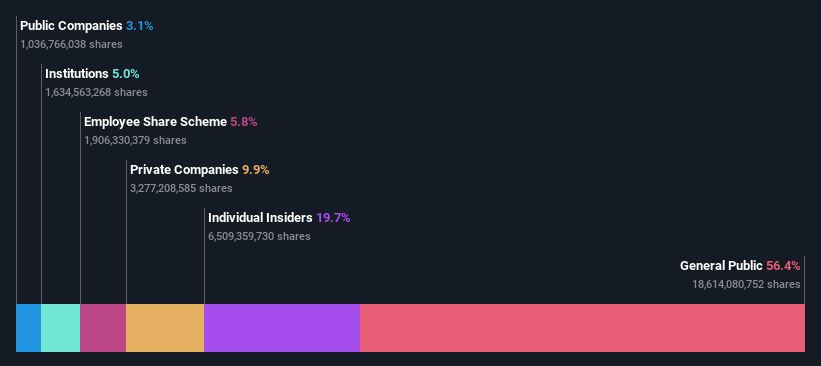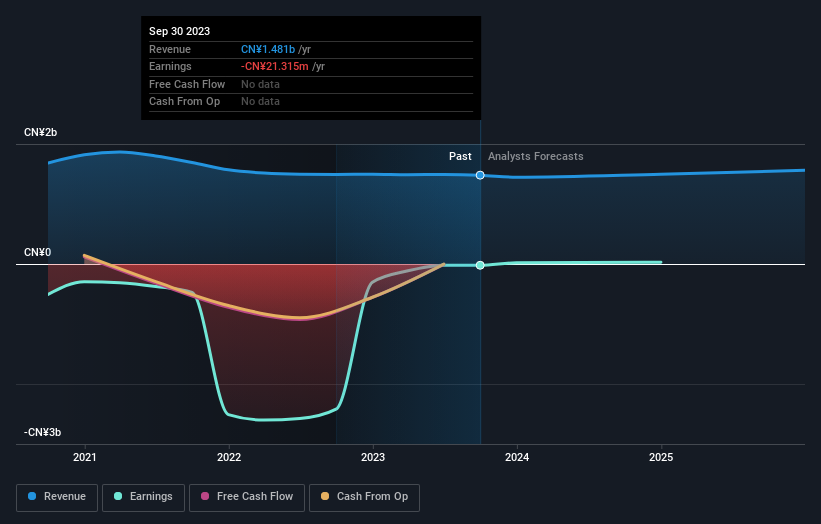China Youzan Limited (HKG:8083) surges 12%; individual investors who own 56% shares profited along with insiders

Key Insights
- Significant control over China Youzan by individual investors implies that the general public has more power to influence management and governance-related decisions
- The top 19 shareholders own 44% of the company
- 20% of China Youzan is held by insiders
If you want to know who really controls China Youzan Limited (HKG:8083), then you'll have to look at the makeup of its share registry. And the group that holds the biggest piece of the pie are individual investors with 56% ownership. Put another way, the group faces the maximum upside potential (or downside risk).
Following a 12% increase in the stock price last week, individual investors profited the most, but insiders who own 20% stock also stood to gain from the increase.
Let's delve deeper into each type of owner of China Youzan, beginning with the chart below.
View our latest analysis for China Youzan

What Does The Institutional Ownership Tell Us About China Youzan?
Institutions typically measure themselves against a benchmark when reporting to their own investors, so they often become more enthusiastic about a stock once it's included in a major index. We would expect most companies to have some institutions on the register, especially if they are growing.
Since institutions own only a small portion of China Youzan, many may not have spent much time considering the stock. But it's clear that some have; and they liked it enough to buy in. If the business gets stronger from here, we could see a situation where more institutions are keen to buy. We sometimes see a rising share price when a few big institutions want to buy a certain stock at the same time. The history of earnings and revenue, which you can see below, could be helpful in considering if more institutional investors will want the stock. Of course, there are plenty of other factors to consider, too.

Hedge funds don't have many shares in China Youzan. Looking at our data, we can see that the largest shareholder is the CEO Ning Zhu with 18% of shares outstanding. Meanwhile, the second and third largest shareholders, hold 5.8% and 5.2%, of the shares outstanding, respectively.
On studying our ownership data, we found that 19 of the top shareholders collectively own less than 50% of the share register, implying that no single individual has a majority interest.
Researching institutional ownership is a good way to gauge and filter a stock's expected performance. The same can be achieved by studying analyst sentiments. There is some analyst coverage of the stock, but it could still become more well known, with time.
Insider Ownership Of China Youzan
While the precise definition of an insider can be subjective, almost everyone considers board members to be insiders. Company management run the business, but the CEO will answer to the board, even if he or she is a member of it.
Most consider insider ownership a positive because it can indicate the board is well aligned with other shareholders. However, on some occasions too much power is concentrated within this group.
Our most recent data indicates that insiders own a reasonable proportion of China Youzan Limited. It has a market capitalization of just HK$3.0b, and insiders have HK$592m worth of shares in their own names. We would say this shows alignment with shareholders, but it is worth noting that the company is still quite small; some insiders may have founded the business. You can click here to see if those insiders have been buying or selling.
General Public Ownership
The general public -- including retail investors -- own 56% of China Youzan. This level of ownership gives investors from the wider public some power to sway key policy decisions such as board composition, executive compensation, and the dividend payout ratio.
Private Company Ownership
Our data indicates that Private Companies hold 9.9%, of the company's shares. It's hard to draw any conclusions from this fact alone, so its worth looking into who owns those private companies. Sometimes insiders or other related parties have an interest in shares in a public company through a separate private company.
Public Company Ownership
Public companies currently own 3.1% of China Youzan stock. This may be a strategic interest and the two companies may have related business interests. It could be that they have de-merged. This holding is probably worth investigating further.
Next Steps:
It's always worth thinking about the different groups who own shares in a company. But to understand China Youzan better, we need to consider many other factors. For instance, we've identified 2 warning signs for China Youzan (1 doesn't sit too well with us) that you should be aware of.
But ultimately it is the future, not the past, that will determine how well the owners of this business will do. Therefore we think it advisable to take a look at this free report showing whether analysts are predicting a brighter future.
NB: Figures in this article are calculated using data from the last twelve months, which refer to the 12-month period ending on the last date of the month the financial statement is dated. This may not be consistent with full year annual report figures.
New: AI Stock Screener & Alerts
Our new AI Stock Screener scans the market every day to uncover opportunities.
• Dividend Powerhouses (3%+ Yield)
• Undervalued Small Caps with Insider Buying
• High growth Tech and AI Companies
Or build your own from over 50 metrics.
Have feedback on this article? Concerned about the content? Get in touch with us directly. Alternatively, email editorial-team (at) simplywallst.com.
This article by Simply Wall St is general in nature. We provide commentary based on historical data and analyst forecasts only using an unbiased methodology and our articles are not intended to be financial advice. It does not constitute a recommendation to buy or sell any stock, and does not take account of your objectives, or your financial situation. We aim to bring you long-term focused analysis driven by fundamental data. Note that our analysis may not factor in the latest price-sensitive company announcements or qualitative material. Simply Wall St has no position in any stocks mentioned.
About SEHK:8083
China Youzan
An investment holding company, provides online and offline e-commerce solutions in the People’s Republic of China, Japan, and Canada.
Fair value with mediocre balance sheet.

